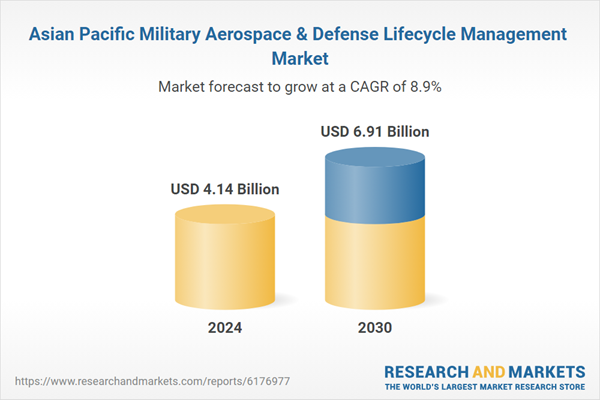Speak directly to the analyst to clarify any post sales queries you may have.
10% Free customizationThis report comes with 10% free customization, enabling you to add data that meets your specific business needs.
Market Drivers
Increasing Defense Budget
Rising defense budgets across nations are driving the demand for advanced lifecycle management solutions in military aerospace and defense. Higher allocations enable organizations to invest in state-of-the-art systems, modernize aging fleets, and implement advanced maintenance and asset management technologies. The expansion of budgets encourages defense agencies to adopt comprehensive lifecycle management platforms that cover procurement, deployment, maintenance, and decommissioning, ensuring maximum efficiency and operational readiness.Investment in digital solutions, including predictive maintenance tools and integrated monitoring systems, becomes feasible with enhanced funding, allowing organizations to optimize asset utilization, reduce operational costs, and minimize unexpected downtime. For instance, in 2025, Asia-Pacific defence spending reached USD 632.2 billion, rising 5.1% in real terms, with China accounting for USD 291.8 billion (46.1%) and core US allies Japan, South Korea, Taiwan, and Australia spending USD 181.1 billion (28.6%). When including Singapore, the Philippines, and Thailand, the US-aligned total rises to USD 211.0 billion (33.3%). Growth among the four main US partners slowed to 2.2% in 2025, following a record 13.2% spike in 2023, driven largely by Japan and South Korea’s double-digit increases.
Key Market Challenges
Integration with Legacy Systems
Integrating modern lifecycle management solutions with legacy defense systems presents a significant challenge. Many aerospace and defense organizations operate aging platforms with outdated software and hardware infrastructure, which complicates the seamless adoption of advanced digital tools. Compatibility issues may arise when connecting legacy systems with predictive maintenance platforms, digital twins, or cloud-based monitoring solutions. Data silos within legacy architectures hinder comprehensive asset visibility and real-time decision-making, reducing the efficiency of lifecycle management initiatives. Organizations must invest in extensive system upgrades, middleware solutions, or custom integration frameworks to bridge the gap between old and new technologies. In some cases, personnel require specialized training to manage hybrid systems, further increasing operational complexity and costs.Key Market Trends
Cloud-Based Lifecycle Management
Cloud-based lifecycle management solutions are emerging as a dominant trend in military aerospace and defense. Leveraging cloud infrastructure enables centralized storage of maintenance records, operational data, and analytics outputs, facilitating seamless collaboration across departments and locations. Cloud platforms offer scalability, allowing organizations to handle large volumes of asset data without significant on-premise infrastructure investment. Real-time data access enhances decision-making, as maintenance teams and operators can monitor asset health, schedule repairs, and track performance metrics from anywhere. Cloud-based systems also support integration with AI, machine learning, and predictive analytics tools, enabling proactive maintenance and better resource planning. Security measures, including encryption, access controls, and compliance protocols, protect sensitive defense information stored in the cloud.Key Market Players
- Aras Corp
- ATS Global B.V.
- Dassault Systèmes
- Infor
- Prolim
- PTC
- Cyient Limited
- Siemens AG
- Kovair Software, Inc
- IFS AB
Report Scope:
In this report, Asia Pacific Military Aerospace & Defense Lifecycle Management Market has been segmented into the following categories, in addition to the industry trends which have also been detailed below:Asia Pacific Military Aerospace & Defense Lifecycle Management Market, By Type:
- Product Lifecycle Management
- Service Lifecycle Management
Asia Pacific Military Aerospace & Defense Lifecycle Management Market, By Application:
- Aerospace Defense Manufacturers
- Airlines Fleet Operators
- Defense In - Service Support
- Independent MRO
- Military Operators
- Others
Asia Pacific Military Aerospace & Defense Lifecycle Management Market, By Country:
- China
- India
- Japan
- Indonesia
- Thailand
- South Korea
- Australia
- Rest of APAC
Competitive Landscape
Company Profiles: Detailed analysis of the major companies present in Asia Pacific Military Aerospace & Defense Lifecycle Management Market.Available Customizations:
With the given market data, the publisher offers customizations according to the company’s specific needs. The following customization options are available for the report.Company Information
- Detailed analysis and profiling of additional market players (up to five).
This product will be delivered within 1-3 business days.
Table of Contents
Companies Mentioned
- Aras Corp
- ATS Global B.V.
- Dassault Systèmes
- Infor
- Prolim
- PTC
- Cyient Limited
- Siemens AG
- Kovair Software, Inc
- IFS AB
Table Information
| Report Attribute | Details |
|---|---|
| No. of Pages | 135 |
| Published | September 2025 |
| Forecast Period | 2024 - 2030 |
| Estimated Market Value ( USD | $ 4.14 Billion |
| Forecasted Market Value ( USD | $ 6.91 Billion |
| Compound Annual Growth Rate | 8.9% |
| Regions Covered | Asia Pacific |
| No. of Companies Mentioned | 10 |









